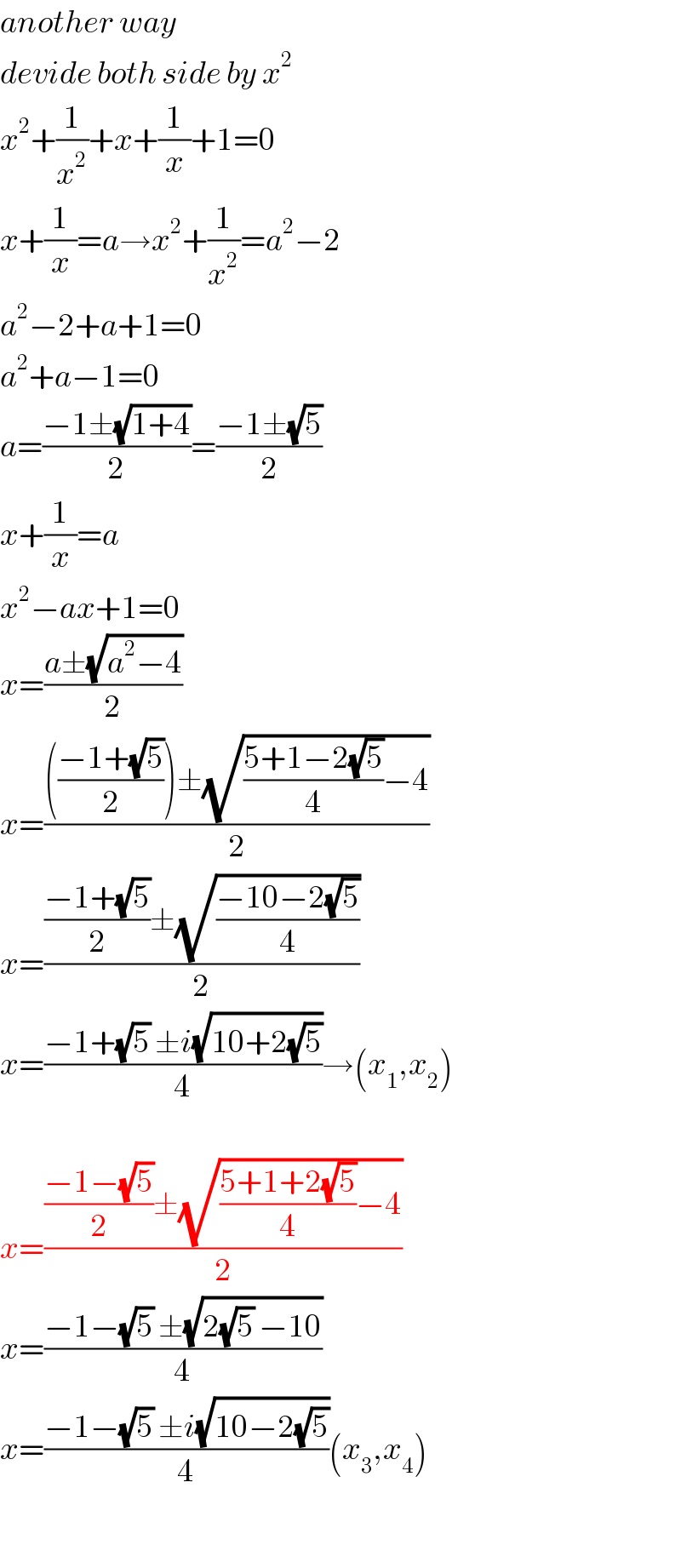Question Number 62424 by aliesam last updated on 21/Jun/19

Commented by mathmax by abdo last updated on 21/Jun/19
![1 is not root for this equatio (e) ⇔((1−x^5 )/(1−x)) =0 ⇔ x^5 =1 let x =re^(iθ) ( we take x from C) x^5 =1 ⇔ r^5 e^(5iθ) =e^(i2kπ) ⇔ r=1 and 5θ =2kπ ⇒θ =((2kπ)/5) k∈[0,4] the roots are x_k =e^(i((2kπ)/5)) x_0 is not roots ⇒k∈[1,4] x_1 =e^((i2π)/5) ,x_2 = e^(i(((4π)/5))) =e^(i(π−(π/5))) =−e^(−((iπ)/5)) x_3 = e^(i(((6π)/5))) =e^(i(π+(π/5))) =−e^((iπ)/5) x_4 =e^(i(((8π)/5))) =e^(i(2π−((2π)/5))) = e^(−((i2π)/5)) and we see that x_4 =x_1 ^− and x_3 =x_2 ^−](https://www.tinkutara.com/question/Q62429.png)
$$\mathrm{1}\:{is}\:{not}\:{root}\:{for}\:{this}\:{equatio}\: \\ $$$$\left({e}\right)\:\Leftrightarrow\frac{\mathrm{1}−{x}^{\mathrm{5}} }{\mathrm{1}−{x}}\:=\mathrm{0}\:\Leftrightarrow\:{x}^{\mathrm{5}} \:=\mathrm{1}\:\:{let}\:{x}\:={re}^{{i}\theta} \:\:\:\:\:\left(\:\:{we}\:{take}\:{x}\:{from}\:{C}\right) \\ $$$${x}^{\mathrm{5}} \:=\mathrm{1}\:\:\:\Leftrightarrow\:\:{r}^{\mathrm{5}} \:{e}^{\mathrm{5}{i}\theta} \:={e}^{{i}\mathrm{2}{k}\pi} \:\Leftrightarrow\:{r}=\mathrm{1}\:\:{and}\:\:\mathrm{5}\theta\:=\mathrm{2}{k}\pi\:\Rightarrow\theta\:=\frac{\mathrm{2}{k}\pi}{\mathrm{5}}\:\:\:\:{k}\in\left[\mathrm{0},\mathrm{4}\right] \\ $$$$\:{the}\:{roots}\:{are}\:{x}_{{k}} ={e}^{{i}\frac{\mathrm{2}{k}\pi}{\mathrm{5}}} \:\:\:\:{x}_{\mathrm{0}} {is}\:{not}\:{roots}\:\Rightarrow{k}\in\left[\mathrm{1},\mathrm{4}\right] \\ $$$${x}_{\mathrm{1}} ={e}^{\frac{{i}\mathrm{2}\pi}{\mathrm{5}}} \:\:,{x}_{\mathrm{2}} =\:{e}^{{i}\left(\frac{\mathrm{4}\pi}{\mathrm{5}}\right)} \:={e}^{{i}\left(\pi−\frac{\pi}{\mathrm{5}}\right)} \:=−{e}^{−\frac{{i}\pi}{\mathrm{5}}} \\ $$$${x}_{\mathrm{3}} =\:{e}^{{i}\left(\frac{\mathrm{6}\pi}{\mathrm{5}}\right)} \:={e}^{{i}\left(\pi+\frac{\pi}{\mathrm{5}}\right)} \:=−{e}^{\frac{{i}\pi}{\mathrm{5}}} \\ $$$${x}_{\mathrm{4}} ={e}^{{i}\left(\frac{\mathrm{8}\pi}{\mathrm{5}}\right)} \:={e}^{{i}\left(\mathrm{2}\pi−\frac{\mathrm{2}\pi}{\mathrm{5}}\right)} \:=\:{e}^{−\frac{{i}\mathrm{2}\pi}{\mathrm{5}}} \:\:{and}\:\:{we}\:{see}\:{that}\:{x}_{\mathrm{4}} =\overset{−} {{x}}_{\mathrm{1}} \:\:\:\:{and}\:{x}_{\mathrm{3}} =\overset{−} {{x}}_{\mathrm{2}} \\ $$
Commented by aliesam last updated on 21/Jun/19

$$\mathrm{well}\:\mathrm{done}\:\mathrm{sir}\:\mathrm{thank}\:\mathrm{you} \\ $$
Answered by tanmay last updated on 21/Jun/19

$${another}\:{way} \\ $$$${devide}\:{both}\:{side}\:{by}\:{x}^{\mathrm{2}} \\ $$$${x}^{\mathrm{2}} +\frac{\mathrm{1}}{{x}^{\mathrm{2}} }+{x}+\frac{\mathrm{1}}{{x}}+\mathrm{1}=\mathrm{0} \\ $$$${x}+\frac{\mathrm{1}}{{x}}={a}\rightarrow{x}^{\mathrm{2}} +\frac{\mathrm{1}}{{x}^{\mathrm{2}} }={a}^{\mathrm{2}} −\mathrm{2} \\ $$$${a}^{\mathrm{2}} −\mathrm{2}+{a}+\mathrm{1}=\mathrm{0} \\ $$$${a}^{\mathrm{2}} +{a}−\mathrm{1}=\mathrm{0} \\ $$$${a}=\frac{−\mathrm{1}\pm\sqrt{\mathrm{1}+\mathrm{4}}}{\mathrm{2}}=\frac{−\mathrm{1}\pm\sqrt{\mathrm{5}}}{\mathrm{2}} \\ $$$${x}+\frac{\mathrm{1}}{{x}}={a} \\ $$$${x}^{\mathrm{2}} −{ax}+\mathrm{1}=\mathrm{0} \\ $$$${x}=\frac{{a}\pm\sqrt{{a}^{\mathrm{2}} −\mathrm{4}}}{\mathrm{2}} \\ $$$${x}=\frac{\left(\frac{−\mathrm{1}+\sqrt{\mathrm{5}}}{\mathrm{2}}\right)\pm\sqrt{\frac{\mathrm{5}+\mathrm{1}−\mathrm{2}\sqrt{\mathrm{5}}}{\mathrm{4}}−\mathrm{4}}}{\mathrm{2}} \\ $$$${x}=\frac{\frac{−\mathrm{1}+\sqrt{\mathrm{5}}}{\mathrm{2}}\pm\sqrt{\frac{−\mathrm{10}−\mathrm{2}\sqrt{\mathrm{5}}}{\mathrm{4}}}}{\mathrm{2}} \\ $$$${x}=\frac{−\mathrm{1}+\sqrt{\mathrm{5}}\:\pm{i}\sqrt{\mathrm{10}+\mathrm{2}\sqrt{\mathrm{5}}}}{\mathrm{4}}\rightarrow\left({x}_{\mathrm{1}} ,{x}_{\mathrm{2}} \right) \\ $$$$ \\ $$$${x}=\frac{\frac{−\mathrm{1}−\sqrt{\mathrm{5}}}{\mathrm{2}}\pm\sqrt{\frac{\mathrm{5}+\mathrm{1}+\mathrm{2}\sqrt{\mathrm{5}}}{\mathrm{4}}−\mathrm{4}}}{\mathrm{2}} \\ $$$${x}=\frac{−\mathrm{1}−\sqrt{\mathrm{5}}\:\pm\sqrt{\mathrm{2}\sqrt{\mathrm{5}}\:−\mathrm{10}}}{\mathrm{4}} \\ $$$${x}=\frac{−\mathrm{1}−\sqrt{\mathrm{5}}\:\pm{i}\sqrt{\mathrm{10}−\mathrm{2}\sqrt{\mathrm{5}}}}{\mathrm{4}}\left({x}_{\mathrm{3}} ,{x}_{\mathrm{4}} \right) \\ $$$$ \\ $$
Commented by Tawa1 last updated on 21/Jun/19

Commented by Tawa1 last updated on 21/Jun/19

$$\mathrm{Help}\:\mathrm{me}\:\mathrm{with}\:\mathrm{this}\:\mathrm{sir}.\: \\ $$
